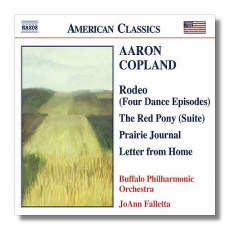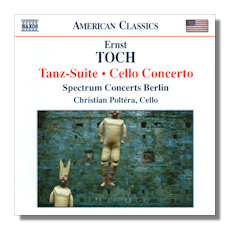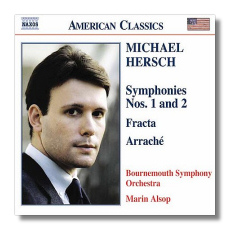
The Internet's Premier Classical Music Source
Related Links
- Latest Reviews
- More Reviews
-
By Composer
-
Collections
DVD & Blu-ray
Books
Concert Reviews
Articles/Interviews
Software
Audio
Search Amazon
Recommended Links
Site News
 CD Review
CD Review
Naxos American Classics

Aaron Copland
- Rodeo (Four Dance Episodes)
- The Red Pony Suite
- Prairie Journal
- Letter from Home
Buffalo Philharmonic Orchestra/JoAnn Falletta
Naxos American Classics 8.559240


Ernst Toch
- Dance Suite, Op. 30
- Concerto for Cello, Op. 35
Christian Poltera, cello
Spectrum Concerts Berlin/Thomas Carroll
Naxos American Classics 8.559282


Michael Hersch
- Symphony #1 (1998)
- Symphony #2 (2001)
- Fracta
- Arraché
Bournemouth Symphony Orchestra/Marin Alsop
Naxos American Classics 8.559281
JoAnn Falletta is a talented conductor and has been recognized for her considerable skills by many critics and by a growing segment of the public. I wouldn't be surprised if she is soon appointed music director of a first-tier orchestra, here or abroad. Not that the Buffalo Philharmonic is a second-string ensemble – I've heard them in concert (when David Zinman was their conductor) and on recordings, always finding this orchestra a fine, thoroughly professional group. It's just that their reputation has not yet risen to the actual level of their collective talents.
At any rate, Falletta draws truly spirited readings from her Buffalo players, readings that rival Copland's own for Columbia Masterworks in Rodeo. Copland led the London Symphony Orchestra, which didn't quite capture the cowboy idiom the way the Berlin Philharmonic Orchestra does. Listen to how deftly the quirky start-and-stop character of the middle section theme in Buckaroo Holiday is rendered here. And in Falletta's hands the finale, Hoe Down, is a real romp, full of humor, tricky rhythms, and playful menace – and again featuring that trademark Copland start-and-stop middle section, which comes across with an insouciant confidence and a sense of utter joy. In fact, that's pretty much how most of the work sounds here. This is one of the finest recordings of Rodeo you will hear. Snatch it up, not least because the couplings are just as good.
Prairie Journal is a thoroughly engaging piece, pleasant, light and full of color, full of that Coplandesque Americana. Letter from Home is a more relaxed (at least in the outer sections), sentimental piece, but full of the same kind of buoyancy and optimism. The longest work on the disc is the seven-movement suite from the 1948 film score The Red Pony. Again, the music brims with a sense for the prairie, for folk-like simplicity, too. Copland, in fact, described the suite as music for children, and overall its expressive language is quite simple, its themes and harmonies easily grasped. The playing on all these works is splendid, filled with exuberance and spirit. All in all, this is a fine disc. Excellent sound, too. Kudos to JoAnn Falletta!
And now for a look at a Copland contemporary who fled Nazi Germany, eventually to settle in the United States. Ernst Toch is a generally overlooked, even forgotten figure today, though he has garnered some notice recently. Like so many worthwhile composers of the 20th century seeking elbow room in a crowded field though, I'm not sure he'll get the attention he deserves. The music here is delightful: Tanz-Suite (1923-24), scored for Flute, Clarinet, Violin, Viola, Double Bass and Percussion, is a generally light work that is quite accessible, even though it sports many elements common to the more advanced works of the early-1920s. Its harmonies are bold and original without detracting from the mostly playful, whimsical character of the music. The melodies are generally engaging, and the music is always atmospheric in its efforts to impart a distinct mood. It's almost as if the composer were reaching out to convey some extra-musical feeling or happening – it is, as its title suggests, a sort of ballet. One can imagine various scenarios.
The last of the six movements, really a large waltz, is the most substantial here and seems to offer new detail, new vistas upon each hearing. It opens eerily with sul ponticello effects from the strings, then moves to a somber character, the music toughening and deepening its expressive character. Brighter music struggles to seize the emotional reins, but cannot, as the darker mood refuses to lessen its grip. Soon, however, things lighten and the latter half of this movement is optimistic in its slightly Richard Straussian character, even if all clouds are not dispelled. Though this is a light work, it conveys a deeper expressive character than many such chamber pieces. The performance is excellent all around.
The Cello Concerto (1924-25) is a little tougher to digest, a bit austere, with scoring that suggests Hindemith (who was then a modernist in outlook) and even Schoenberg. Still, the melodies and harmonies are generally graspable and won't come across as difficult. Krenek and others then were writing much more advanced, much more challenging music. The first and third movements of the concerto, at around ten minutes each, are the most substantial in content, though the energetic second panel, marked Agitato, is instantly catchy, at least to me. Overall, the work must be regarded as a masterpiece. There is at least one other recording available, on Albany Records, with cellist Steven Honigberg. I haven't heard that effort, but can say that this Naxos offering is certainly well played, both by soloist Christian Poltera and the members of Spectrum Concerts Berlin. The sound on this disc is vivid. Highly recommended.
When was the last time you purchased a CD that contained multiple compositions, all written within the last decade? This Naxos disc of works by the American Michael Hersch (b. 1971) is such an offering. It contains his first two symphonies, #1 from 1998 and #2 from 2001, and two short orchestral works, Fracta (2002) and Arraché (2004).
The Second Symphony leads off the disc. Cast in four movements, the last three played without pause, this nineteen-minute work begins as a violent, nightmarish torrent, then subsides to an unsettling calm. There are further outbursts and contrasting sections of calm throughout the symphony, but above the proceedings lingers a sense of anger and darkness. In the end, one assesses the work as a profound outpouring inspired by some tragedy. The insightful notes, by Andrew Druckenbrod, mention that the symphony was written in the immediate aftermath of the 9/11 tragedy, but that Hersch has acknowledged no connection to it here. Much in the notes is also made of Hersch's use of clusters in his orchestration and soundscape, but suffice it to say here that this unusual work, with its deftly-imagined, contrapuntal third movement (at six-and-a-half minutes, the longest of the four), will challenge many with its dense orchestration, high levels of dissonance and austere character, but will yield the patient listener many aural rewards, lugubrious though they may be.
The one-movement First Symphony is of similar character, its apparent subject matter death and endurance of loss in the hope of final triumph over grief and life's challenges. Most of the music is bleak, with a funeral march presented early on and no hint of optimism, let alone hope, until the close. Here, the dissonant funereal chimes heard at the opening are played now in more consonant tones as a resounding, triumphant unison C rings out. A fine but gloomy work.
Fracta is an imaginative transcription of the chamber piece by Claus Peter Flor, After Hölderlin's 'Hälfte des Lebens' for clarinet and cello. Arraché ('torn away), the most recent work and, at about seven minutes, the shortest on the disc, is also the most rhythmically charged and manic. It is programmatic, expressing the composer's reaction to hostage mistreatment in Iraq. Again – and understandably – the character of the piece is dark and angry, but here also there is a sense of numbness at the work's close, as if shock has overtaken one's emotions. A worthwhile, if disturbing piece.
There is little doubt that Hersch is a talented composer – his orchestration is imaginative and absolutely assured, and his grasp of contrapuntal writing is masterful. Yet, while the technique and means are there, his tendency toward anger and pessimism tend to darken his music with an austerity that will turn many listeners away.
Marin Alsop leads all performances here with a knowing sense for this composer's dark and angry expressive manner. The works are brilliantly played by the Bournemouth Symphony Orchestra and the sound is vivid. Recommended to adventurous listeners.
Copyright © 2007, Robert Cummings




















